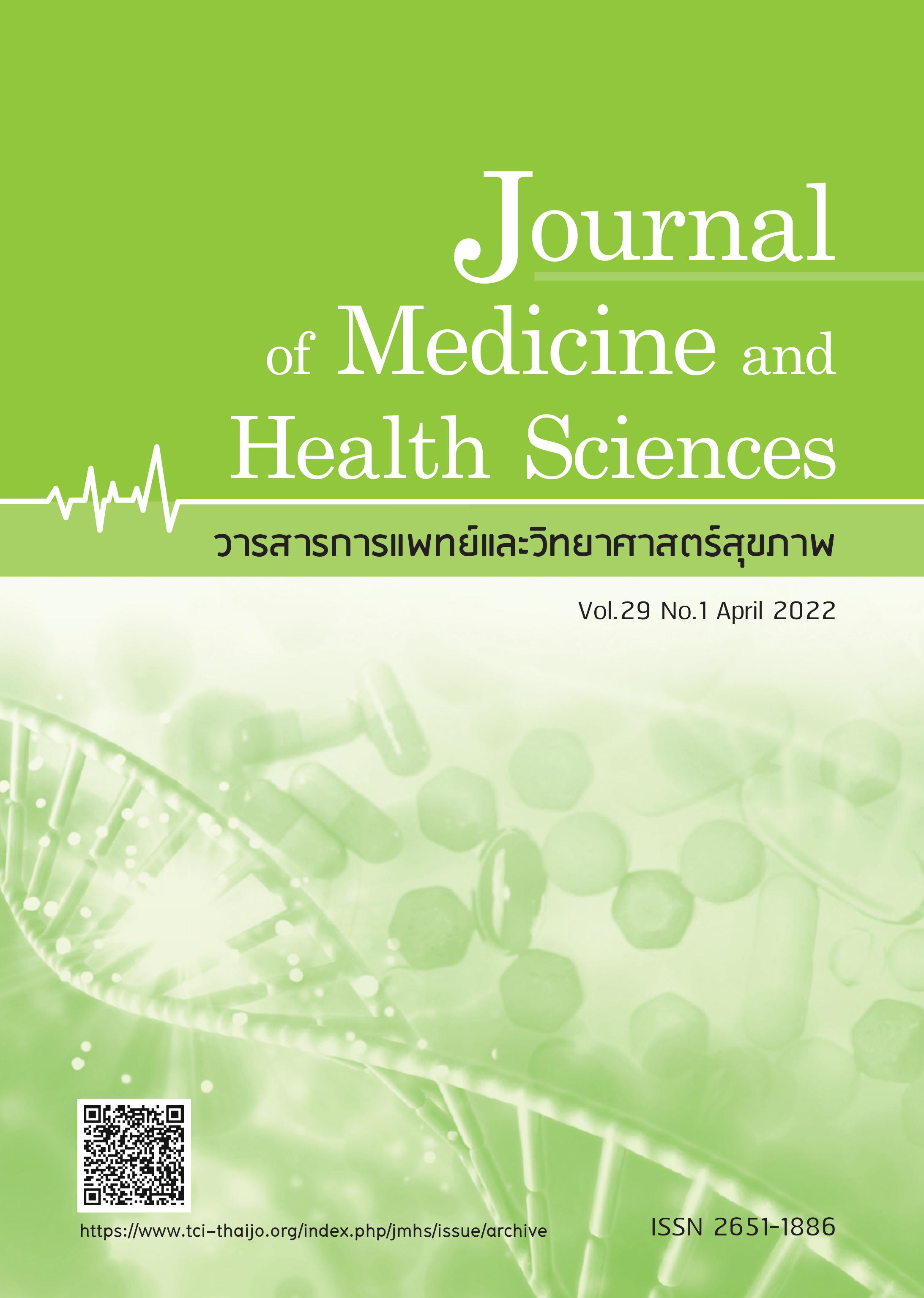The effectiveness of promoting self-efficacy with organization support program on health behaviours and HbA1 C among workers with Diabetes mellitus
Keywords:
self-efficacy, health behaviour, HbA1C, diabetes mellitusAbstract
Abstract
Self-efficacy is an important theory in terms of behavioral changes among non-communicable disease patients, including those with Diabetes mellitus. This quasi-experimental study aims to evaluate the effectiveness program of promoting self-efficacy with organizational support for health behaviors and HbA1C levels among diabetic workers. The study was conducted between May to July 2019. There were 60 diabetic patients and employees from an instant elastic thread factory and an instant food factory were randomized and divided into 30 participants each, in an experimental and a control group. The research instrument consisted of a self-efficacy and health behavior questionnaire, and HbA1C measurement. The aspect of self-efficacy with an organizational support program was assigned to the experimental group, and consisted of knowledge about diabetes mellitus, food selection, exercise, taking medicine and stress management, accompanied with organizational support. The data were analyzed with descriptive statistics, a paired sample t-test and an independent sample t-test. The results revealed that after finishing the intervention program in the eighth week, the experimental group had higher and statistically significant self-efficacy and health behavior scores than the control group (p<0.01). The HbA1C value of the experimental group also significantly decreased when compared to starting the intervention program, and lower than the control group (p<0.01). The promoting of self-efficacy program and health promotion policy for employees could improve health behaviors and further control blood sugar levels to close to normal levels among workers. Therefore, activities to change health behavior among employees should be supported by adjusted for each organizational context. This will be beneficial for both health and quality of life among employees, reduce absences due to sickness, and increased productivity in organizations.
References
World Health Organization WHO: Global report on Diabetes Mellitus – prevention and control: [Cited 2020 August 16], Available from: https://apps.who.int/iris/ bitstream/handle/10665/204871/9789241565257_eng.pdf;jsessionid= D6449F737D3B9A2D21D3C373A3E95C61? sequence=1.
Division of Non-Communicable Diseases:Annual report 2019 NCD. 1st ed. Bangkok;
Diabetes Association of Thailand under The Patronage of Her Royal Highness
Princess Maha Chakri Sirindhorn. Clinical practice guideline for Diabetes Mellitus. 3rd ed. Pathum-tani; 2017.
Kaiwikaikoson A, Wanchai A, Kaewsasri A, et al. Stress management of patients with
Diabetes in Thailand. BCNUT J Nurs 2018; 10:1-16.
Muangkum A, Suttajit S. Effects of patient empowerment on self-efficacy, adherence
and glycemic control in patients with type 2 Diabetes. TPHSJ 2013;8:104-11.
Tantinantrakun S, Phinnarach K, Khorskul S. Factors related to health-promotion
behaviors among working populationat risk of type 2 Diabetes Mellitus in a community in Chonburi province, Thailand. CUTJ 2020;26:1-14.
Bandura A. Self-efficacy: toward a unifying theory of behavioral change. Psychological
review. 1977;84:191.
Panprom T, Sitthisarankun P. Health promotion survey in provincial government
organizations Bangkok and Pattaya City. J DMS 2008;33:1-8.
Phothisat S. Clinical complication in type 2 diabetic patients. 1st ed. Nonthaburi:
Institute of Medical Research and Technology Assessment; 2011.
Chanchaisri U. Effects of the self-efficacy program on blood sugar control behavior
of Diabetes Mellits. J RRU 2015;1:161-76.
Division of Non-Communicable Diseases. Operating guidelines the workplace is disease-free, safe, physically and mentally happy. 2nd ed. Nonthaburi: Agricultural cooperative printing demonstrations of Thai Co. Ltd; 2016.
Boonpradit A,Khampeng S, Wannachatisara K. The effects of self- efficacy enhancement
program on health behaviors among patients with Diabetes in Nong-Done district, Saraburi province. JPNC 2016;27:72-82.
Lee S.K, Kang B.Y, Kim H.G, et al. Predictors of medication adherence in elderly patients with chronic diseases using support vector machine models. Healthc Inform Res 2013;19:33-41.
Nilnon P. Self-Efficacy in food consumption and exercise of elderly club members
Bang Khla district, Chachoengsao province. J RRU 2018;1:93-100.
Wichit N, Mnatzaganian G, Courtney M, et al. Randomized controlled trial of a family -
oriented self-management program to improve Self efficacy glycemic control and quality of life among Thai individuals with type 2 Diabetes. Diabetes Res Clin Pract (2017):37-48.
Thongkaew T, Jadesadalus V. Perceived organizational support, organizational behavior citizenship and academic performance of academic staff of Rajabhat Universities in Rattanakosin group. e-JODIL 2017;7:68-81.
Aunprom-me S. Milestones in health promotion: Statement from Global Conference. 1st ed. Bangkok: Thanapress Company Limited; 2013.
Kebede MM, Pischke CR. Popular Diabetes apps and the impact of Diabetes app use
on self- care behaviour: A survey among the digital community of persons with diabetes on social media. Front Endocrinol 2019;10:1-14.
Katasila A, Thongdee S, Prasomrak P. Assessment of clinical skills and social support for self-care behavior and level of fasting blood sugar of patients with Diabetes in Mahachanachai district, Yasothon province. J Sci Tech UBU 2017;19:233-43.
Downloads
Published
How to Cite
Issue
Section
License

This work is licensed under a Creative Commons Attribution-NonCommercial-NoDerivatives 4.0 International License.



